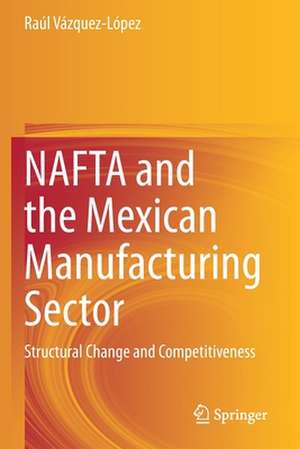NAFTA and the Mexican Manufacturing Sector: Structural Change and Competitiveness
Autor Raúl Vázquez-Lópezen Limba Engleză Paperback – 16 sep 2021
Providing historical context for the evolution of Mexico’s economy after trade liberalization, this volume will be of interest to students, scholars, and researchers of industrial economics, economic development, Latin-American studies, developing studies, international economics, international relations, political science, and economic geography.
| Toate formatele și edițiile | Preț | Express |
|---|---|---|
| Paperback (1) | 377.95 lei 6-8 săpt. | |
| Springer International Publishing – 16 sep 2021 | 377.95 lei 6-8 săpt. | |
| Hardback (1) | 385.25 lei 6-8 săpt. | |
| Springer International Publishing – 15 sep 2020 | 385.25 lei 6-8 săpt. |
Preț: 377.95 lei
Nou
Puncte Express: 567
Preț estimativ în valută:
72.34€ • 78.61$ • 60.81£
72.34€ • 78.61$ • 60.81£
Carte tipărită la comandă
Livrare economică 21 aprilie-05 mai
Preluare comenzi: 021 569.72.76
Specificații
ISBN-13: 9783030552671
ISBN-10: 3030552675
Pagini: 113
Ilustrații: VI, 113 p. 17 illus., 1 illus. in color.
Dimensiuni: 155 x 235 mm
Greutate: 0.18 kg
Ediția:1st ed. 2020
Editura: Springer International Publishing
Colecția Springer
Locul publicării:Cham, Switzerland
ISBN-10: 3030552675
Pagini: 113
Ilustrații: VI, 113 p. 17 illus., 1 illus. in color.
Dimensiuni: 155 x 235 mm
Greutate: 0.18 kg
Ediția:1st ed. 2020
Editura: Springer International Publishing
Colecția Springer
Locul publicării:Cham, Switzerland
Cuprins
Introduction.- Chapter 1: Structural heterogeneity in Mexican manufacturing industry, 1994-2008.- Chapter 2: Market concentration and structural change: The food, beverages and tobacco industry.- Chapter 3: The transformation of the textile and apparel sector after NAFTA.- Chapter 4: The chemical industry and the globalization process.- Chapter 5: Global insertion and dynamic competitiveness in the automotive and electromechanical industry.- Conclusions.- References.
Notă biografică
Raúl Vázquez López is a senior researcher at the Institute of Economic Research at the National Autonomous University of Mexico. His research focuses on the topics of industrial competitiveness, labor productivity, economic development and international trade in developing countries.
Textul de pe ultima copertă
This volume discusses the development of the Mexican manufacturing sector during the NAFTA era. This book pursues several objectives simultaneously. Firstly, it gives continuity to and revitalizes the structuralist economic perspective and debate proposed by Latin American development theory. Secondly, it analyzes the trend of structural heterogeneity in Mexico from 1994-2008 using the manufacturing sector as a case study. Lastly, it uses methodologies established by the Economic Commission for Latin America and the Caribbean (ECLAC) to provide an in-depth statistical evaluation of the effects of economic liberalization on structural change, labor productivity, production concentration, and dynamic competitiveness in the main industries of the sector: food, beverages, and tobacco; textiles and apparel; chemistry; electromechanics.
Providing historical context for the evolution of Mexico’s economy after trade liberalization, this volume will be of interest to students, scholars, and researchers of industrial economics, economic development, Latin-American studies, developing studies, international economics, international relations, political science, and economic geography.
Providing historical context for the evolution of Mexico’s economy after trade liberalization, this volume will be of interest to students, scholars, and researchers of industrial economics, economic development, Latin-American studies, developing studies, international economics, international relations, political science, and economic geography.
Caracteristici
Presents a detailed explanation of the evolution of the Mexican manufacturing sector following trade liberalization Revitalizes the structuralist economic perspective for Latin American development theory Provides an alternative perspective of the effects of trade liberalization on the structural transformations, efficiency levels, and competitiveness of the Mexican manufacturing industry
